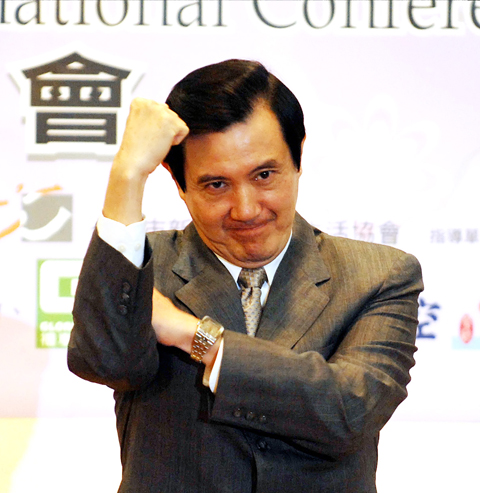Taiwanese exports plunged to a seven-year low last month, with shipments to all major trade partners except Japan suffering sizable contractions as the nation's export-dependent economy was hit hard by the global slowdown, the Ministry of Finance said yesterday.
“Custom-cleared exports fell 23.3 percent, or US$5.09 billion, to US$16.78 billion in November from a year ago,” Lin Lee-jen (林麗貞), head of the ministry's statistics department, told a media briefing yesterday afternoon.
It was the third straight month that overseas shipments contracted, posting their sharpest decline since October 2001, Lin said.

PHOTO: CNA
Similarly, imports fell 13.2 percent, or US$2.32 billion, to US$15.26 billion, the biggest drop since March 2002, leaving a trade surplus of US$1.52 billion, the ministry report said.
Lin pinned the blame of falling trade on the global slowdown that is plaguing the US and Europe and weakening demand for Taiwanese consumer electronic and communications products.
Exports to China, including Hong Kong, which accounted for about 40 percent of the nation's shipments, contracted by a record 38.5 percent, or US$3.53 billion, to US$5.63 billion from last year, the report showed.
Shipments to the US, the nation's second-largest trade partner, fell 14.2 percent, or US$390 million, to US$2.38 billion, the report said.
Shipments to Europe and emerging markets in Asia decreased 9.8 percent and 19.4 percent to US$2.22 billion and US$2.6 billion respectively, the report showed.
Exports to Japan bucked the trend, gaining 19.2 percent year-on-year last month to US$1.5 billion, Lin said, attributing the increase to a stronger yen.
Lin said the figures were disappointing and the trend would persist in the months ahead. The Directorate-General of Budget, Accounting and Statistics forecast on Nov. 20 that exports would likely decline in the first three quarters of next year.
Cumulative exports in the first 11 months of this year stood at US$242.02 billion, up 8.4 percent from last year, while imports grew 15.7 percent to US$229.08 billion, leaving a trade surplus of US$12.94 billion, down 48.7 percent from a year ago, the report showed.
Cheng Cheng-mount (鄭貞茂), chief economist at Citigroup Inc Taiwan, said the latest export data was worse than expected and would drag down the nation's economic showing in the last quarter.
“Citigroup expected exports to drop 9.8 percent and imports to fall 9 percent last month,” Cheng said by telephone. “The outcome spells greater downside risks for Taiwan, with the outlook more bearish in the months to come.”
To halt the trend, Cheng said the central bank could cut interest rates by 50 basis points and adopt other loose monetary measures in its board meeting on Thursday.
Tony Phoo (符銘財), chief economist of Standard Chartered Bank, shared the pessimistic sentiment, saying it would be difficult for export orders to pick up in the first half of next year.
Phoo also voiced concern about the weakening trade surplus and shrinking shipments to China.
“The trade surplus for the first 11 months is too low,” Phoo said by telephone. “I'm surprised it failed to exceed US$2 billion.”
Phoo expects the central bank to cut interest rates by 25 basis points to stimulate the economy.

DEFENDING DEMOCRACY: Taiwan shares the same values as those that fought in WWII, and nations must unite to halt the expansion of a new authoritarian bloc, Lai said The government yesterday held a commemoration ceremony for Victory in Europe (V-E) Day, joining the rest of the world for the first time to mark the anniversary of the end of World War II in Europe. Taiwan honoring V-E Day signifies “our growing connections with the international community,” President William Lai (賴清德) said at a reception in Taipei on the 80th anniversary of V-E Day. One of the major lessons of World War II is that “authoritarianism and aggression lead only to slaughter, tragedy and greater inequality,” Lai said. Even more importantly, the war also taught people that “those who cherish peace cannot

STEADFAST FRIEND: The bills encourage increased Taiwan-US engagement and address China’s distortion of UN Resolution 2758 to isolate Taiwan internationally The Presidential Office yesterday thanked the US House of Representatives for unanimously passing two Taiwan-related bills highlighting its solid support for Taiwan’s democracy and global participation, and for deepening bilateral relations. One of the bills, the Taiwan Assurance Implementation Act, requires the US Department of State to periodically review its guidelines for engagement with Taiwan, and report to the US Congress on the guidelines and plans to lift self-imposed limitations on US-Taiwan engagement. The other bill is the Taiwan International Solidarity Act, which clarifies that UN Resolution 2758 does not address the issue of the representation of Taiwan or its people in

Taiwanese Olympic badminton men’s doubles gold medalist Wang Chi-lin (王齊麟) and his new partner, Chiu Hsiang-chieh (邱相榤), clinched the men’s doubles title at the Yonex Taipei Open yesterday, becoming the second Taiwanese team to win a title in the tournament. Ranked 19th in the world, the Taiwanese duo defeated Kang Min-hyuk and Ki Dong-ju of South Korea 21-18, 21-15 in a pulsating 43-minute final to clinch their first doubles title after teaming up last year. Wang, the men’s doubles gold medalist at the 2020 and 2024 Olympics, partnered with Chiu in August last year after the retirement of his teammate Lee Yang

The Philippines yesterday criticized a “high-risk” maneuver by a Chinese vessel near the disputed Scarborough Shoal (Huangyan Island, 黃岩島) in a rare incident involving warships from the two navies. The Scarborough Shoal — a triangular chain of reefs and rocks in the contested South China Sea — has been a flash point between the countries since China seized it from the Philippines in 2012. Taiwan also claims the shoal. Monday’s encounter took place approximately 11.8 nautical miles (22km) southeast” of the Scarborough Shoal, the Philippine military said, during ongoing US-Philippine military exercises that Beijing has criticized as destabilizing. “The Chinese frigate BN 554 was